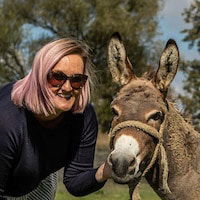Hello there! I’m an Australian living in Croatia, married to a local with two energetic boys aged 11 and 6, diving deep into the vibrant world of the Croatian language. As a fellow language learner, let me take you on a journey through the linguistic landscape of this beautiful country with the rich cultural heritage I now call home.
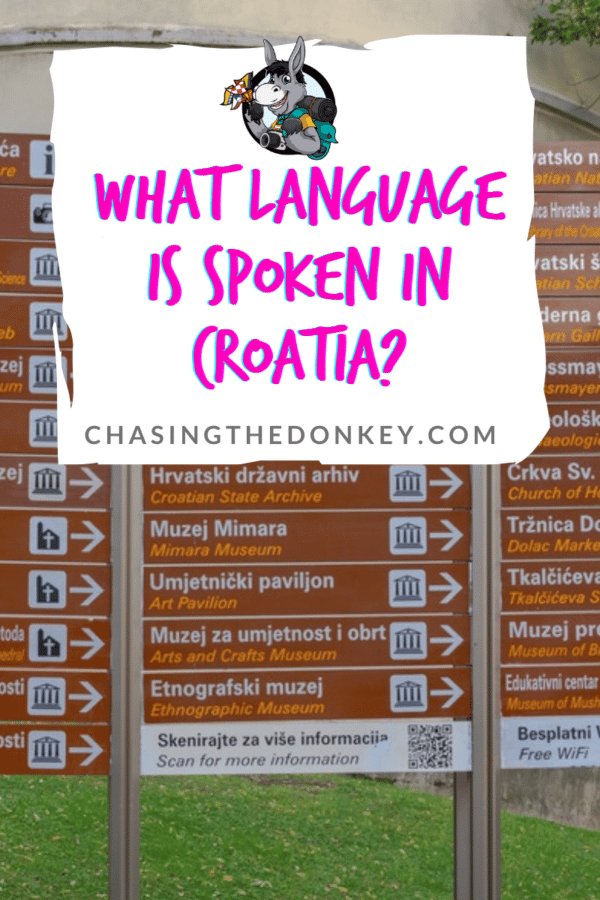
So, What Language Do They Speak In Croatia?
There are a little under 4 million people in Croatia, and the official language of Croatia is “Croatian,” which is known as Hrvatski in Croatian.
It is one of the South Slavic languages and is written in the Latin alphabet.
There’s a high degree of mutual intelligibility between Croatian and Serbian. The native language of Croatian is closely related to standard Bosnian and, standard Serbian, and Montenegrin, but it has its own distinct characteristics and dialects. The three major dialects spoken in Croatia are Čakavian, Kajkavian, and Štokavian, with Štokavian being the basis of the standard Croatian language.
But there are many more regional dialects – everyone I ask tells me a different number. But it is a lot, which is not surprising given the many different regions in Croatia.
Do They Speak English In Croatia?
English is widely spoken, especially in tourist parts of Croatia, major cities like Zagreb, Split, and Dubrovnik, and along the stunning Adriatic coast. Croats, particularly the younger crowd and those in the hospitality industry, have a pretty good grasp of English, thanks to the country’s strong emphasis on language education and the booming tourism sector.
While standard Croatian is the official is the official language, you’ll find that menus, signs, and information in popular tourist spots often come in English, too.
Skip Ahead To My Advice Here!
Discover The History Of The Language Spoken In Croatia
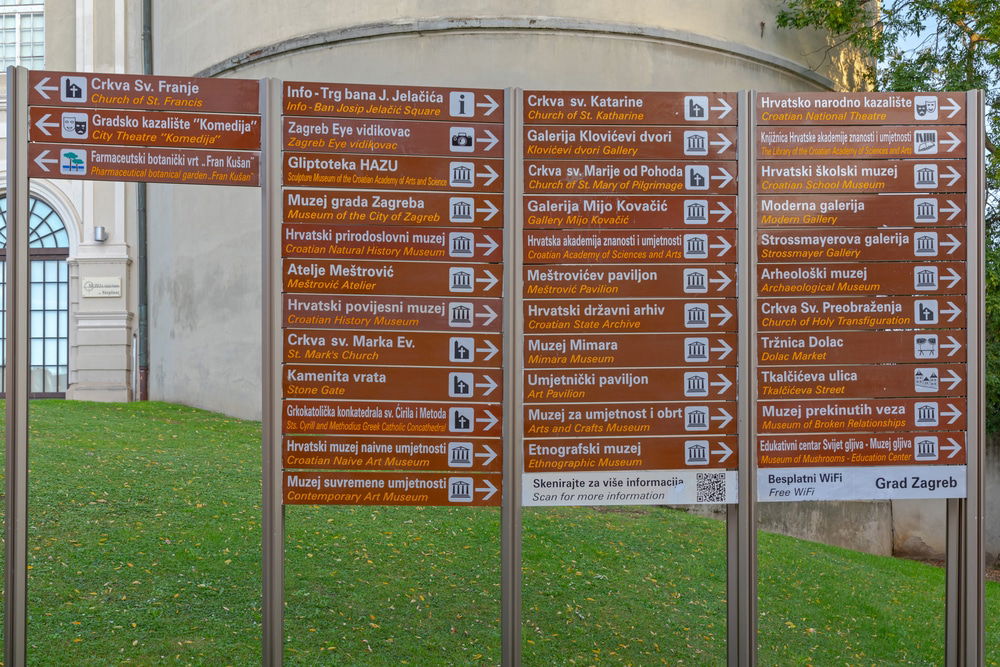
Alright, let’s jazz up the history of the national language in Croatia a bit and throw in some cool facts!
So, Croatia’s not just about those jaw-dropping coastlines. Croatia, with cities like Dubrovnik and Split, situated along the Adriatic coast, is also home to a language as fascinating as its scenery. Croatian, which is part of the South Slavic language gang, has a lot in common with Serbian, Bosnian, and Montenegrin. But it’s got its own special Croatian twist.
Here’s a fun historical tidbit: Croatian kicked Latin to the curb as the official language nearly 175 years ago, on October 23, 1847, thus making a difference in the Croatia’s history. It started showing up in parliament in 1848.
Now, the superhero behind this language revolution was Ivan Kukuljević Sakcinski, a history buff and writer from Varaždin. This guy made a bold move on May 2, 1843, by giving a speech in Croatian in the Croatian Parliament.
Talk about a mic-drop moment for such a relatively small country!
He was all about making Croatian the go-to language in schools and offices, and he knew how important it was to keep Croatian from being overshadowed by other languages. Before this, Latin was the go-to language in parliament, but Kukuljević Sakcinski was like, “Nope, it’s our time now!”
So, next time you’re chatting in Croatian, give a little nod to Kukuljević Sakcinski.
National Dialects & Regional Variations Of The Official Language
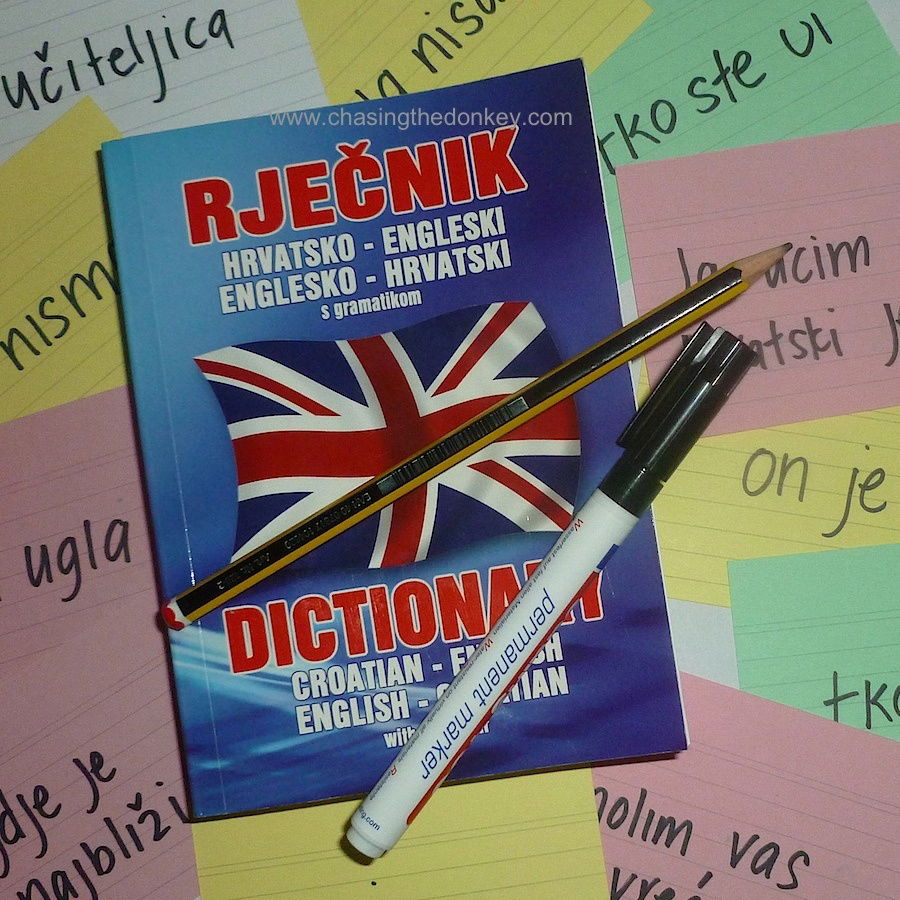
You know, Croatia may not be the biggest country on the map, but let me tell you, the variety in dialects here is something else!
We’ve got Čakavian along the coast, where the language almost dances with the rhythm of the waves. Then there’s Kajkavian up in the northwest – it’s got this old-world charm to it, like a song from days gone by. And the big one, Štokavian, that’s what they teach in schools and what you’ll hear a lot while visiting Split.
The funny thing is, even living here and picking up Croatian bit by bit, these dialects can throw me for a loop.
Like, our business partners from Zagorje, right? And when he chats with his family, it’s like they’re speaking another language compared to what I am used to on the Dalmatian Coast. I’m there scratching my head, but luckily, my husband’s got it down, so he fills me in later. It’s all part of the adventure, I guess – keeps life here interesting!
Information On Croatian Language In Daily Life
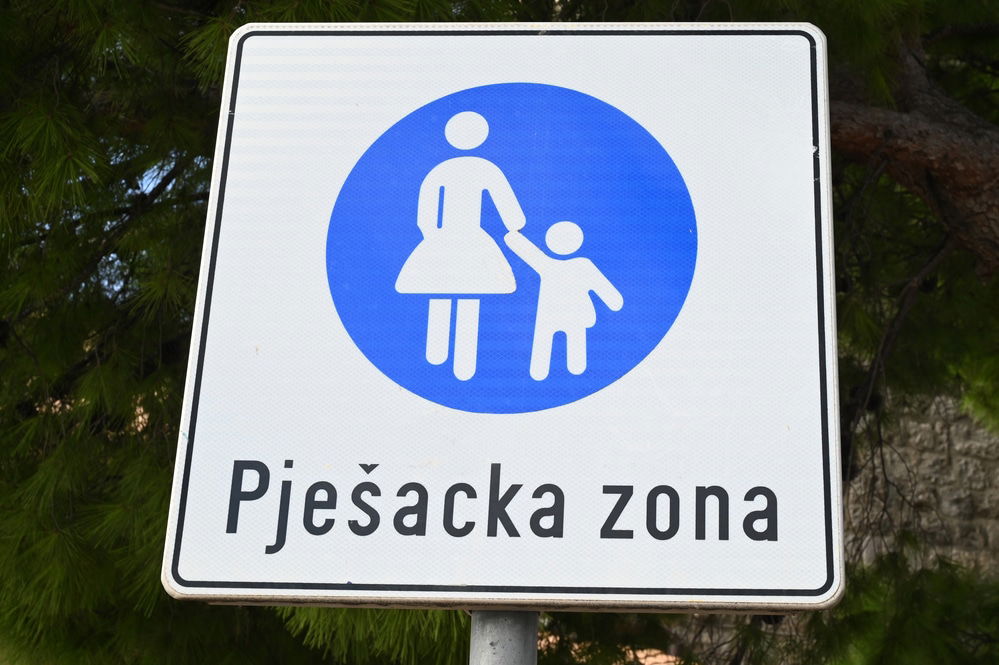
So, here’s the deal with Croatian and languages in general in this lovely country. First off, Croats are pretty savvy when it comes to languages. Besides Croatian, most people here in countries such as Montenegro and Serbia juggle more than one language.
It’s like a linguistic gymnastics! Balancing between intelligible languages.
Now, about English – it’s a big deal here. Kids start learning English as a second language in school from around the 4th grade. Imagine that! And the foreign language learning doesn’t stop there. Later on, they pick up a third language. Talk about multi-lingual talents, right?
Here’s a fun fact that blew my mind: Croatia ranks 11th out of 113 countries in the EF English Proficiency Index.
My guess is that it is mostly the younger generations. Croatia got a score of 603, while the global average is just 502. That’s pretty impressive! It means that not only do they start young, but they also get really good at learning basic phrases.
From personal experience, it’s fascinating to see my own boys, aged 11 and 6, navigating through the different languages. They speak English and Croatian and even dabble in a third language, German, at school. My oldest also learns parts of new languages on a language app. His new favorite is Greek.
It’s like they’re building their own mini Babel tower, and I’m just trying to keep up! The good news is when we go to Germany, my kid can help read for us.
So, next time you’re wondering about languages in Croatia, remember – these folks are like language ninjas and their English proficiency? Top-notch!
Brands We Use And Trust
Minority Languages – What Other Language Is Spoken In Croatia?
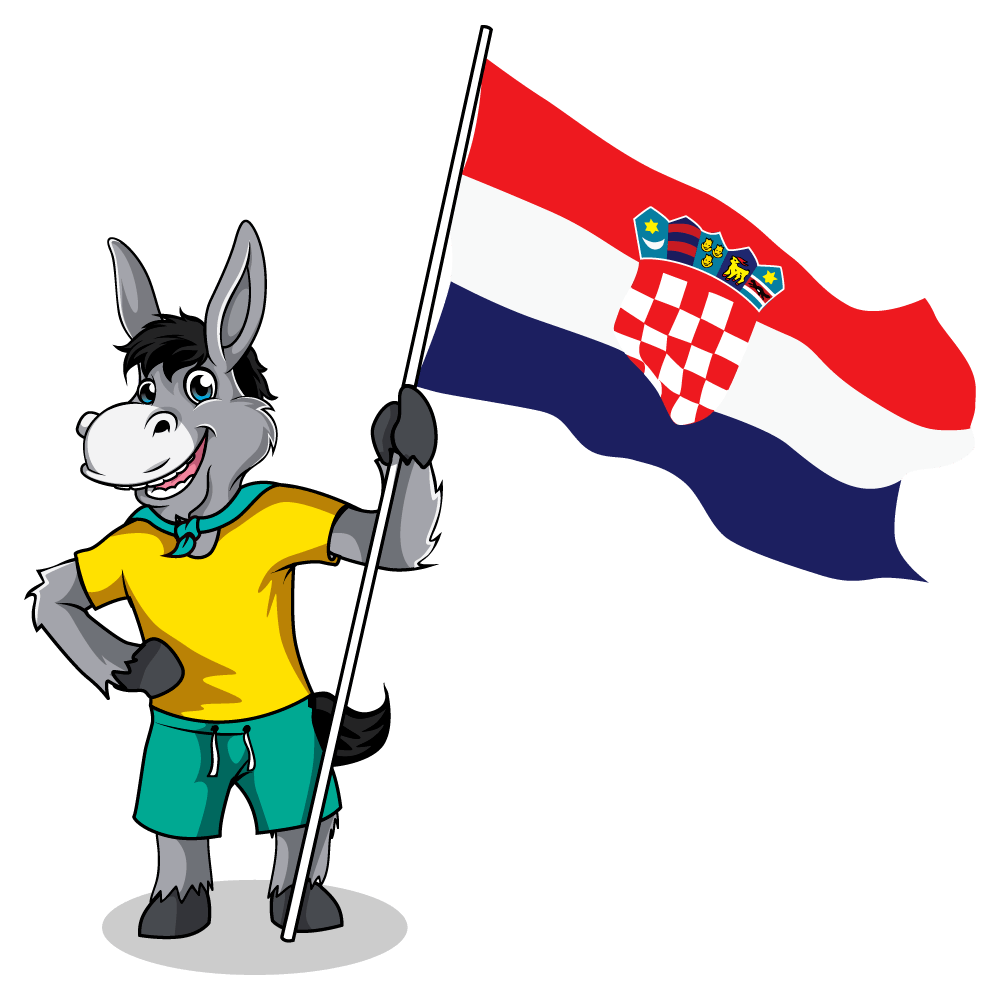
Alright, let’s chat about the other languages you’ll hear in Croatia – it’s not just Croatian and English, you know!
So, besides Croatian, there’s a whole mix of languages of Croatia that are spoken by different folks here as minority languages. Think of it like a linguistic buffet. You’ve got
- Serbian
- English
- Czech, similar to Croatian, is a part of the same language family.
- Italian
- German
- Hungarian
- Slovak, and even
- Romani is another unique language to discover in Croatia.
It’s a pretty cool mix.
And here’s the scoop: Italian and German are like the popular kids in the language school, but English? It’s the superstar, as I already told you!
Everyone’s learning it or already chatting away. It’s like the universal language glue holding all these different tongues together. Croatia has this amazing language diversity going on, and it’s pretty awesome to experience!
Popular Croatian Language Phrases Travelers Might Need
Whether you’re ordering a coffee or saying hello, knowing a few Croatian phrases goes a long way. “Dobar dan” (Good day) and “Hvala” (Thank you) are your best friends. Trust me, the locals appreciate the effort!
If you want to go further, below are some of the things you can learn to say. Click here for a massive list of Croatian phrases for travel that Mateja (my old Croatian language teacher) gave me to learn.
Good Morning/ Good Evening / Good Night
Dobro jutro (DOH-broh YOO-troh)
Dobra večer(DOH-brah VEH-chehr)
Laku noć (LAH-koo nohtch)
How are you?
Kako ste? That’s one of the basic Croatian words to know. (KAH-koh steh?) Formal
Kako si? (KAH-koh see?) Informal
Fine, thanks.
Dobro, hvala. (DOH-broh, HVAH-lah.) – Useful basic phrases in Croatian
And you?
Vi? (Vee?) Formal
Ti? (Tee?) Informal
Please / Yes, please
Molim (MOH-leem)
Da, molim. (DAH, MOH-leem)
Thank you / Thank you very much
Hvala (HVAH-lah)
Puno hvala (Puh-noh HVAH-lah.)
Croatians Language History
Alright, let’s jazz up the history of the Croatian language a bit!
Way back before Croatian was even a thing, Latin was the cool kid on the block, influencing future literary languages. But then, in the 6th and 7th centuries, the Slavs rolled into the empire and brought their regional Slavic dialect with them.
Fast forward to today, and what we’ve got is this excellent language called Hrvatski, or Croatian as we know it. It’s got these three unique dialects I mentioned earlier – Čakavian, Kajkavian, and Štokavian.
Is Croatian The Same Language As Serbian
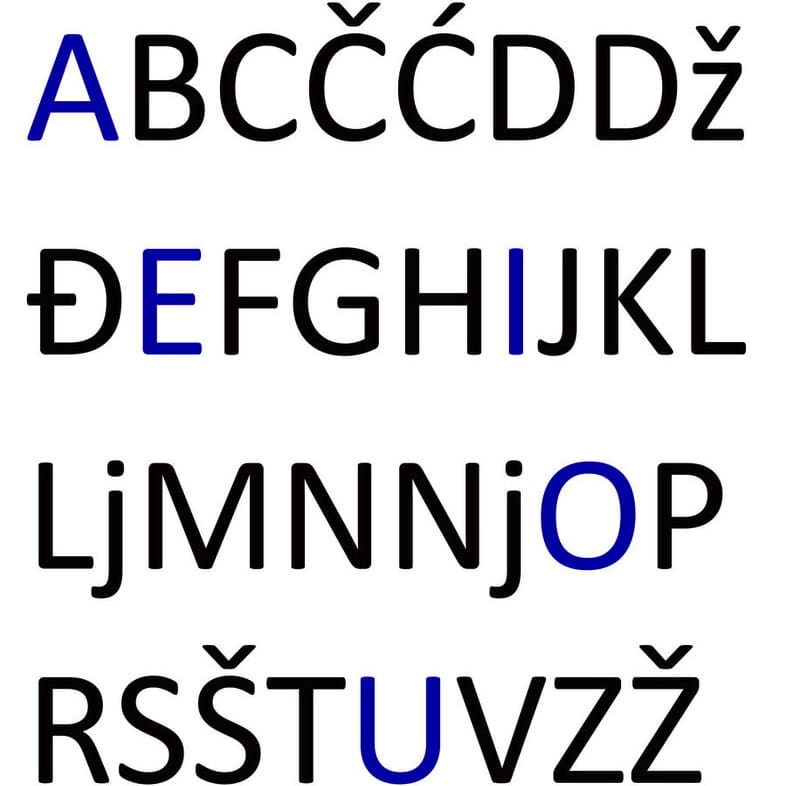
Alright, let’s break down this Croatian vs. Serbian language thing in a way that’s easy to digest.
First up, they are separate languages with different alphabets that we need to identify.
You know how twins can be super similar but still have their quirks? That’s kind of like Croatian and Serbian speakers. Sure, they sound a lot alike and share a ton of words and grammar. But here’s the kicker: Croatian is written in the Roman alphabet, you know, the one we use in English. Meanwhile, Serbian uses the Cyrillic alphabet, which has cool-looking characters that are different from ours.
Linguists often say that Croatian, Serbian, and Bosnian are like three flavors of the same language. But the politics around it can be a bit touchy.
In my experience, when Croatian people, Serbs, and Bosnians chat, they can understand each other.
So, in a nutshell, Croatian and Serbian are like close cousins in the language world. Similar, but with their distinctions.
Where Else Do They Speak Croatian
You might think Croatian is only spoken in Croatia, right? But hold on to your hats because this language gets around!
First up, in Bosnia and Herzegovina, Croatian is one of three official languages, alongside Bosnian and Serbian. Then, over in Austria’s Burgenland region, about 50,000 folks speak Burgenland Croatian. It’s an excellent mix of the local Chakavian dialect with a bit of a twist from other Croatian dialects in the area.
But wait, there’s more! In Italy’s Molise region, you’ll find about 2,000 people familiar with Molise Croatian. This Shtokavian dialect traces back to the history of Croatian Dalmatian refugees from way back in the 15th and 16th centuries.
And guess what? In Serbia, especially in the Vojvodina region, Croatian is pretty important, too, thanks to the large Croatian community there.
To top it off, since 2013, Croatian is one of the official languages of the European Union. Plus, in Romania, in places like Carașova and Lupac, it shares the stage with Romanian.
So, nope, Croatian isn’t just a Croatia thing – it’s a bit of a globetrotter!
Croatian Alphabet Facts
Let’s make the Croatian alphabet a bit more fun and easy to get, shall we?
So, Croatian uses the Latin alphabet, but with a twist – it’s got 30 letters! Imagine that, four more than the usual English set. These extra letters are like the secret sauce that gives Croatia its unique flavor.
There are eight letters in Croatian that are kind of like the cool kids in class – “Č,” “Ć,” “Dž,” “Đ,” “Lj,” “Nj,” “Š,” and “Ž.” They’re special because you won’t find them in the standard English alphabet.
But wait, there’s more! Croatian says ‘no thanks’ to ‘Q,’ ‘W,’ ‘X,’ and ‘Y.’ You might see them hanging around in foreign names or brands, but they’re not part of the regular gang.
And here’s a quirky thing: Croatian has letters that are like a dynamic duo – digraphs! “Dž” is like the ‘j’ in ‘jam,’ “Lj” is a unique sound, kind of like the ‘ll’ in ‘million,’ and “Nj” is like the ‘ny’ in ‘canyon.’ These aren’t just two letters chilling together; they’re considered one letter in Croatian.
So, in a nutshell, the Croatian alphabet is like the usual one but with some cool extras and a few no-shows. It’s what makes Croatian sound so distinct and awesome!
Basic Croatian Words
Native speakers love it when you try to say a few words in Croatian. It’s a very hard language to learn, just ask the many million people worldwide who have tried. That said, here are some fairly easy ones to learn to get you started, and here are a few more if you want to keep going.
Hello
Bok (bohk)
Good Morning/ Good Evening / Good Night
Dobro jutro (DOH-broh YOO-troh)
Dobra večer(DOH-brah VEH-chehr)
Laku noć (LAH-koo nohtch)
How are you?
Kako ste? (KAH-koh steh?) Formal
Kako si? (KAH-koh see?) Informal
Fine, thanks.
Dobro, hvala. (DOH-broh, HVAH-lah.)
And you?
Vi? (Vee?) Formal
Ti? (Tee?) Informal
Please / Yes, please
Molim (MOH-leem)
Da, molim. (DAH, MOH-leem)
Thank you / Thank you very much
Hvala (HVAH-lah)
Puno hvala (Puh-noh HVAH-lah.)
You’re welcome
Nema na čemu (NEH-mah nah cheh-moo)
Goodbye
Doviđenja (Daw-vee-je-nya)
Bye
Bok (bohk)
FAQs About The Croatian Language
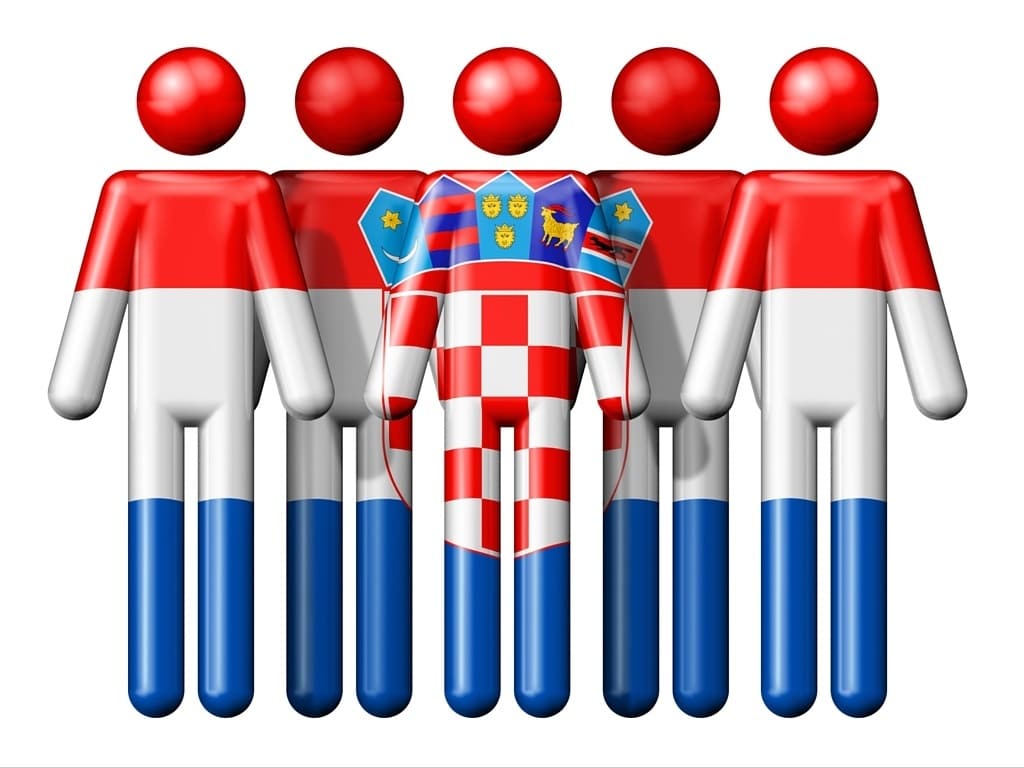
Is it hard to learn Croatian?
In my experience, yes. The grammatical gender, different dialects, and word order are all so vastly different from my mother language. That and I am just a really slow learner, I have come to realize.
Is it hard to understand the pronunciation rules in standard Croatian? No, thanks to the fact that the language is phonetic.
What are some basic greetings in Croatian?
Greetings in Croatian include “Dobar dan” (Good day), “Dobro jutro” (Good morning), “Dobra večer” (Good evening), and “Hvala” (Thank you).
Is learning Croatian phrases difficult?
Learning Croatian can be challenging for non-native speakers, but making an effort to use the language is appreciated by the locals.
Where can I find resources to learn Croatian?
You can find helpful resources on YouTube, where you can watch videos teaching Croatian phrases. Additionally, watching Serbian films with English subtitles can also assist in learning the language.
What are some phrases for shopping and dealing with money?
Phrases for shopping in Croatian include “Koliko košta?” (How much does it cost?) and “Imate li to u drugoj boji?” (Do you have this in a different color?). For dealing with money, “Molim vas, račun” (Please, the bill) can be used when asking for the bill in a restaurant or shop.
How can I navigate transportation in Croatia?
When using public transportation, you can say, “Koliko košta karta do…?” (How much is a ticket to…?) to ask about the ticket price. To get off at a specific stop, say “Ovdje moram izaći” (I need to get off here).
What phrases can I use for directions?
For directions, you can use “Gdje je…?” (Where is…?) followed by the name of the place you’re looking for. You can also ask, “Kako doći do…?” (How do I get to…?) to ask for directions to a specific location.
What are some useful phrases for eating and drinking?
When dining, you can say “Molim jelovnik” (Can I have the menu, please?). To order food or drinks, use “Molim” (Please) followed by the item you wish to order, such as “Molim jedan sendvič” (Please, one sandwich).
What are some phrases for sightseeing and attractions?
When sightseeing, you can ask, “Možete li mi preporučiti neka popularna mjesta?” (Can you recommend some popular places?). To express admiration for a sight or attraction, you can say “Predivno je” (It’s beautiful).
What should I know about accommodations?
Phrases for accommodations include “Imate li slobodne sobe?” (Do you have any available rooms?) and “Molim vas, mogu li dobiti Wi-Fi lozinku?” (Can I have the Wi-Fi password, please?).
What is the Croatian language code?
The Croatian language code is HR, which stands for Hrvatski.
How can I handle difficult situations or emergencies?
In case of emergencies, learn these phrases: “Pomoć!” (Help!), “Hitna pomoć” (Emergency medical help), and “Gdje je najbliža policijska postaja?” (Where is the nearest police station?).
Move This Adventure To Your Inbox & Get An Instant Freebie

No spam. Unsubscribe at any time.
Learning Croatian: Challenges And Resources
As someone who’s still grappling with the nuances of Croatian, I can say it’s a challenging yet rewarding journey. There are resources for learners like me, such as the University of Zagreb’s language courses, many, many online platforms, one like this one that gives you one online lesson for free, and local language cafes in Zagreb, all making learning Croatian accessible and fun.
My Final Word On Languages In Croatia
So now that we’ve answered the fact that Croatian is the official language – of several languages spoken in the country.
Trust me, understanding even just a little Croatian is key to experiencing Croatian culture and heritage if you live here. I have tried very hard, but as a native English speaker who never learned a language before the age of 36, it has been challenging.
Although, if you are on vacation, then you can speak other languages and have no problem finding someone who speaks your vocab across all sections of the tourism industry. Croatians know that it is not the most widely spoken language option, so they all will happily try to talk to you in your language while you’re on your trip.
- What To Pack For Croatia
- Ultimate Guide To Accommodation In Croatia
- Come To Zagreb For A Dental Implant Vacation
- Best Beaches In Croatia
- Croatia Airport Transfers
- Weird, Interesting & Unique Things To Do In Croatia
- Explore Croatia In Winter
- Croatian Wine You Can’t-Miss
- Croatia Road Trip Itinerary
- Game Of Thrones Locations & Tours In Croatia
- Best Day Trips From Dubrovnik
- Places, Cities, And Towns In Croatia To Explore
- Car Free Islands In Croatia
- What You Need To Know For Planning A Trip To Croatia
- Is Croatia Safe To Travel? Helpful Safety Tips

